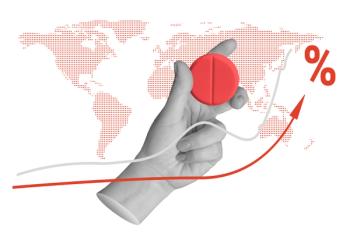
Q&A: Improving E-Prescribing With FDB Vela
Drug Topics® sat down with Bob Katter to discuss what FDB Vela brings to the table to improve the prescribing process, particularly with specialty medications.
Drug Topics®: I wanted to start off by discussing the work that FDB is doing to really advance medical knowledge, improve critical health care decision-making processes. What's currently on the docket?
Bob Katter: Oh absolutely, I'm always happy to talk about that. I guess we'll just start with a little bit of history. First Databank [FDB], we've been around as a company for over 40 years, which is kind of hard to believe.
What we do, our traditional core business is that we publish information. It's really more computer readable information in a database format for the entire industry, pharmacies, electronic health records inside of hospitals, instead of doctors’ offices, systems that insurance companies use, including pharmacy benefit managers. We publish that information, descriptive information on drugs, clinical information, pricing, kind of the whole gambit and then the industry deploys that information in various software systems. When we say we're helping advance medical decisions, traditionally our data has been used for what people will commonly refer to as drug safety checks, there was a drug interaction or maybe the dose was too high, and so on.
We think that's been a huge advance for health care because that has made the prescribing, administration, dispensing of drugs safer, but the way the system works today is very nonspecific. It's kind of what I would almost call theoretical. So, you're prescribing a drug or you’re a pharmacist dispensing drugs and you see in your pharmacy system through what's called drug utilization review all of these alerts or warnings. They may or may not apply to the specific patient you're handing the drug today because the way the system works now is very generalized. The systems will show all the alerts that may apply because we don't really know that much about that patient.
With the cloud-based technology now, we can change that so we're introducing what we call our ‘patient first’ solution. We're working with a major pharmacy retailer right now. And what that does is that takes it through the cloud, information on that specific patient, so the pharmacist is essentially handing the patient the drugs right then and is going to counsel them or hand them information or potentially call the prescriber. The ‘patient first’ solution takes in information on that specific patient and then provides information based on our clinical knowledge, what our team views as the most important thing for that patient and what the next step the pharmacist should do. We'll still service alerts if necessary, so if there's a dosing problem, but only if really necessary for that specific patient given their specific clinical background etc.
We think that's going to make pharmacies a) a lot more efficient and b) it's going to actually be safer for the patient because pharmacists will have chance to zero in on what really matters rather than having to wade through this large volume of alerts. We're also developing rolling out similar types of solutions for the patient who is in the hospital and in the office space as well. We're trying to really bring this to the whole industry.
Drug Topics®: What are the some of the benefits of using a cloud native e-prescribing network to manage medications, benefits, and decision-making support?
Katter: One thing we did before we launched Vela, which has been in the works for couple of years now, we actually went out and talked to stakeholders all over the health care industry so major pharmacy retailers, software vendors that serve them, pharmacy benefit managers, EHR systems and health systems that use those EHR systems. Almost everybody said we really want a choice of networks.
Right now in the electronic prescribing industry, in terms of confirming eligibility in benefits for a drug, sending that drug electronically to pharmacy right now runs on a single network. The benefits to having more than one network are more innovation and we think there can be lower costs. I think whenever you have only one of something, it doesn't tend to work out as well in terms of innovation or costs. Obviously, the network has to adhere to standards. We think there can be multiple networks so long as they all meet the standards. We built Vela in conformance with all the NCPDP [National Council for Prescription Drug Programs] standards but we're also building out Vela to provide innovation in areas which the current e-prescribing network doesn't really address as well, particularly in the area of specialty medications.
Drug Topics®: Can you talk a little bit more about that?
Katter: This is where partnerships with these companies like RxRevu and RxLightning come into the picture. With specialty medicine it's generally a medicine that a) could be very expensive and b) could also have a certain level of complexity, in terms of how it needs to be administered, how the patient needs to be monitored, that type of thing. Therefore, they're only dispensed from certain specialty pharmacies. You can't just go into any pharmacy in the country and get your specialty medication.
Right now for a specialty medicine to make it all the way from the prescribing function of the doctor into the patient's hands, most specially medicines have to go through a number of different steps. They have to go through all the steps that any other prescription goes through in terms of drug eligibility and formulary acceptance and being sent electronically to the pharmacy. But in many cases, really in most cases, there are a couple other transactions that need to happen. One is called a real-time pharmacy benefit check and that's where our partnership comes in with RxRevu and what that does is that provides the doctor at the point of prescribing, and potentially other places in the workflow, information on the cost of the medication and importantly what the patient's financial responsibility for the medication is. With that check, it is important that it happens up front. Otherwise, you have a situation where the patient may show up at the pharmacy to get their prescription and find out that their copay or their coinsurance is going to run into the hundreds or maybe even thousands of dollars and we're not going to be able to do that. It's important to get that clarified up front.
Sometimes there's financial assistance available but that's not taken care of upfront, that leads to delays and maybe in some cases that drug not ever being dispensed. There's another step in the process called specialty enrollment, which is a form that's mostly done on paper and fax today that the prescriber has to fill out to go to the specialty pharmacy, which is clinical information related to the medicine and that patient's condition. RxLightning [who we have a partnership with] is a small company that's gotten a lot of traction in automating the specialty enrollment process. There's one final step that happens for almost all specialty medications and that’s a prior authorization and that is available electronically today from a few companies. But again, that's yet another process.
So, if you’re the doctor's office you have to do all of these things for one medication, which is why we see that those medications are taking on average 20+ days to fill, between the time they're prescribed and when the patient actually receives them. That's bad for health care and that's bad for those patients. We think that by pulling all of these things together into one network, we can greatly expedite that process and that’s where those partnership with RxRevu and RxLightning fit in. I want to be clear, at FDB we're not critical of any of the steps. We understand the necessity of all these steps. We just want to make it easier for the doctors and the patients to do those steps so that people can get their drugs.
Drug Topics®: That's incredible. From a patient privacy perspective are there any concerns about the use of the is e-prescribing systems?
Katter: Whenever you are transmitting a patient's information or what the industry refers to as personal health information or PHI because of HIPAA [Health Insurance Portability and Accountability Act of 1996] of course there are concerns. I'd point out a couple of things. First of all, e-prescribing is mandated pretty much across all states. It’s already happening and that's already within the current systems, which turned out to be very secure. Now that doesn't mean we don't all need to be extremely careful and thoughtful going forward.
When we built Vela for instance, we worked with Microsoft Azure and we worked with them very closely to make the system was a) very scalable and b) very secure. As an example, all of the information flowing through that network is encrypted both in storage and in transit, so It's doubly encrypted which is just kind of an industry standard. There are all sorts of other safeguards around access to the network. But that's one of those things. There's nothing that's ever going to take away that concern about security because it's always there. At Vela, we're doing everything within the industry possible to keep that information secure.
Drug Topics®: Are pharmacists and in general health care providers generally open to embrace the use of data and information technology or are there still barriers to implementing these types of technology in the pharmacy space?
Katter: I think they're open and I think in particular as you get a younger set of professionals out there, whether that's on the pharmacy side or the health care provider side. You have to remember that people coming out of pharmacy school now grew up doing things with technology, applying to pharmacy school online etc. With that said, I think there are still concerns or some pushback because the systems aren't nearly as usable as they can be.
So, I return to what I was saying about the ‘patient first’ solutions that we're coming out with, a large reason we think that's a big deal is seeing all of those alerts today makes the system a lot less usable. I think we need to as an industry, and this includes FDB, to do a better job at making the systems more usable right now, less steps, less kinds of information to navigate your way through, and just make it simpler. Pharmacists and others will be willing to adapt to these technologies, but we need to make them better and more usable.
Nearly everybody uses technology, whether it’s to buy things online or enroll your children in school, we all use information technology as part of day-today lives. When the things we're doing professionally are way more difficult to do than what we're doing personally and there's that gap, that’s when I think you run into problems because you think “huh this should just not be that hard to do”. Think about specialty drugs, if you're a doctor it shouldn't be that hard. You should be able to do a few steps and then have the thing be on its way and not have to 5 different things. That's kind of the mentality we're coming at this with. We're not there yet but we're trying to make it more like a normal process.
Drug Topics®: Were there any final points or key takeaways that you want to touch on that we haven't discussed yet?
Katter: I just attended The NCPDP [National Council for Prescription Drug Programs] annual meeting, which is certainly a big conference especially in the pharmacy space and it was great to see people out in person. I heard some commentary that people were kind of surprised that FDB was doing this. I would just stress as I mentioned at the beginning of our interview, FDB has a long history and what we're really known for is having really accurate and timely medication content. The industry depends on us doing that. We're not getting away from that at all. We're still doing that. That's kind of job number one at FDB but we think that Vela and ‘patient first’ and some of these newer things are things we can do to help the industry solve problems that build on the strong foundation of medication content we already have. It's the old FDB plus the new FDB which is kind of solving more problems, but the old FDB is not going anywhere. We still have our large clinical staff and we're still very committed to that work.
Bob Katter, MBA, is president of FDB.
Newsletter
Pharmacy practice is always changing. Stay ahead of the curve with the Drug Topics newsletter and get the latest drug information, industry trends, and patient care tips.























